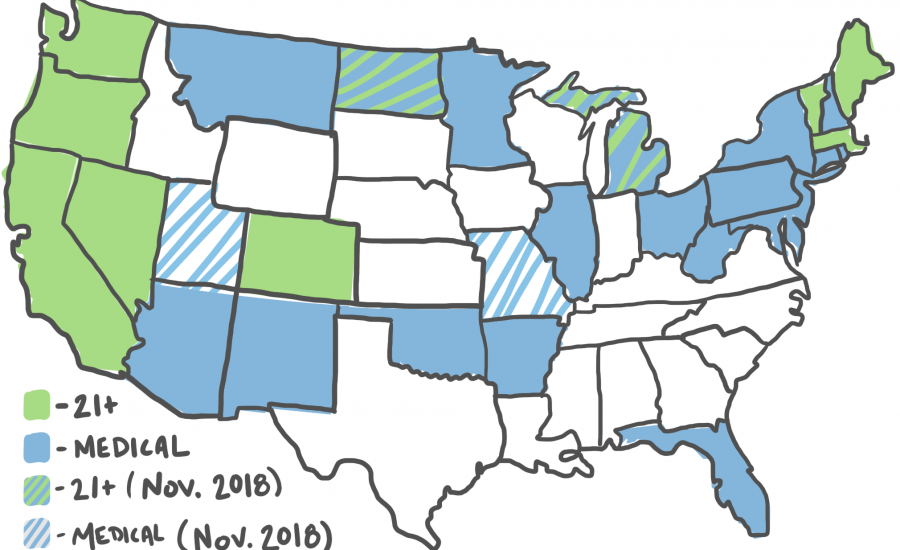As the midterm elections loom, several states across the US have cannabis ballot measures to vote for. Here at Simplifya, we’ll be watching the results closely, ready to cover all things compliance. We cover any state that gives the green light to cannabis.
In light of the upcoming election, we thought we’d give a quick rundown of the biggest cannabis ballot measures.
Cannabis ballot measures
Michigan
Medical cannabis is already legal but Michiganders will be deciding whether they want to be the 10th state to legalize recreational cannabis. With 56% of likely voters supporting the proposal and 41% against, the ballot measure seems likely to pass.

The proposal, dubbed Prop 1 (and supported by the Coalition to Regulate Marijuana like Alcohol), would legalize cannabis for adults 21 and over. The limit of possession in public is 2.5 while you can have up to 10 ounces at home. In regard to plants, there’s a limit of 12 plants per household.
If legalized, a 10% tax would be imposed on cannabis sales. These tax dollars will go towards funding implementation, clinical trials, schools, roads, and local governments. Experts estimate Michigan could generate an additional $100-200 million per year if the measure passes.
North Dakota
Conservative North Dakota is the only other state that is voting on a recreational cannabis ballot measure this year. Measure 3 would legalize recreational use for people aged 21 years or older. What’s unique is measure 3 will also implement an automatic expungement process for those with prior cannabis convictions.

Unfortunately, there isn’t much reliable polling to gauge North Dakotans’ sentiments about the ballot measure. One recent poll found that 51% of respondents supported the measure, while another poll from August found just 38% support.
However, the August poll is hotly contested by advocates who say the poll’s methodology was flawed and that it’s misleading. Advocates claim to see broad support across the state, but we’ll have to wait until election day to find out whether that rings true.
Missouri
Missourians face a confusing set of ballot measures on expanding medical cannabis use. Three separate cannabis ballot measures will compete for the most votes in the state on November 6 – two constitutional amendments and one statutory change.

Amendment 2, sponsored by New Approach Missouri, is currently polling highest among the cannabis ballot measures, with 69% of likely voters planning to vote in favor and 17% against. Amendment 2 imposes a 4% tax on medical cannabis sales, with taxes set to fund veterans programs. It also lists several common qualifying conditions, such as PTSD, epilepsy, and chronic pain. However, they leave the list of qualifying conditions open-ended and under the best judgment of physicians.
Amendment 3, sponsored by Find the Cures and Springfield trial attorney and physician Dr. Brad Bradshaw, also has broad support with 64% of likely voters in favor and 23% against. Amendment 3 is controversial in the state and creates the highest tax on medical cannabis in the country at 15%. The tax is meant to fund an independent research facility. In doing so, he aims to find cures for currently incurable diseases.
Prop C, the statutory measure sponsored by Missourians for Patient Care, has broad support among Missourians. However, it has the least amount of support among the three ballot measures with 62% of likely voters in favor and 25% against. Prop C imposes a 2% tax set to fund drug treatment, veteran services, and early childhood education.
Utah
This November, Utahns will be deciding whether they want to legalize medical cannabis within the state. The Utah Medical Cannabis Act, or Prop 2, will allow qualifying patients to purchase up to 2 ounces of flower or 10 grams of THC or CBD. However, patients would not be allowed to smoke or vaporize marijuana within a two-week period.

The most recent polling from this month shows support at about 51%, with roughly 46% of likely voters opposing the ballot measure. This is a pretty steep drop-off from the roughly 64% of likely voter support in August.
Many attribute this fall in support to opposition by the The Church of Jesus Christ of Latter-day Saints. In fact, support among “very active” LDS members has fallen from 54% in favor and 42% opposed to 28% in favor and 68% opposed since June.
Gov. Gary Herbert has promised to call a special session next month, which would be aimed at taking up compromise legislation meant to please both supporters and opponents of Prop 2. While this plan has mixed support among Utahns, we’ll have to wait until November 6 to see how things turn out.
